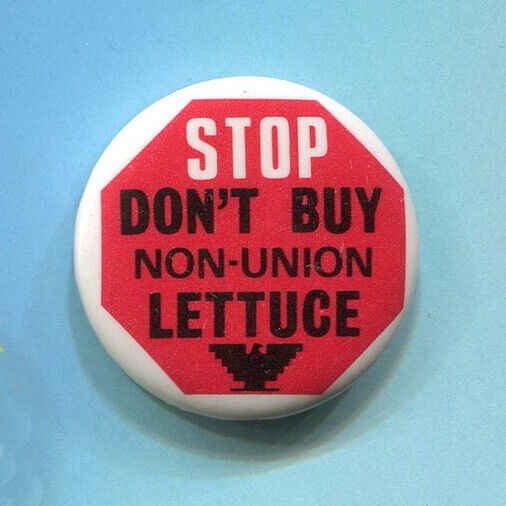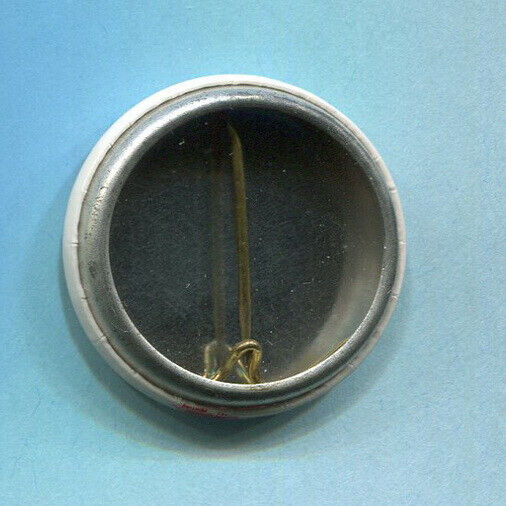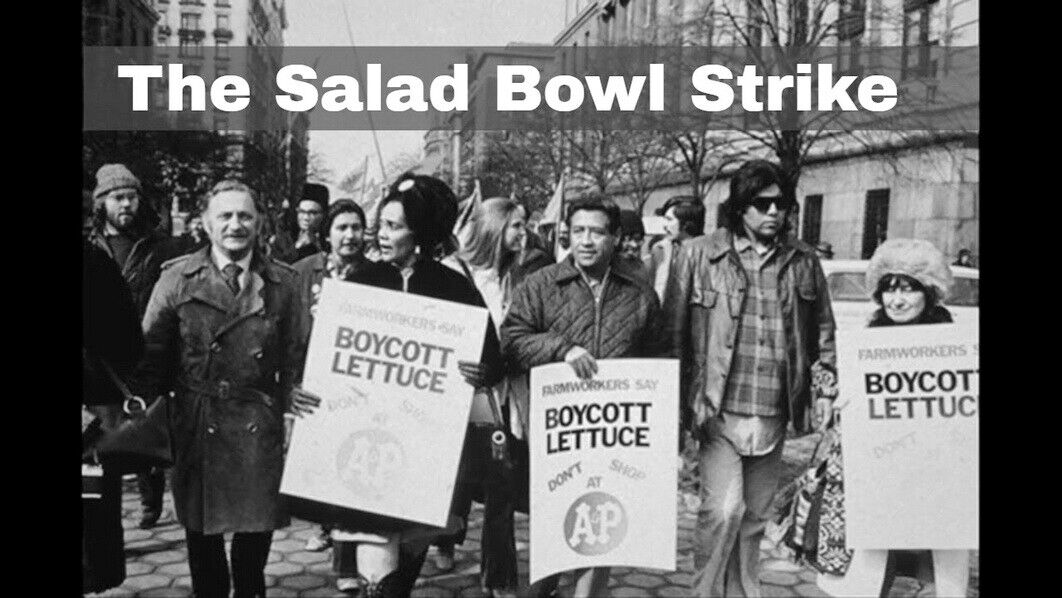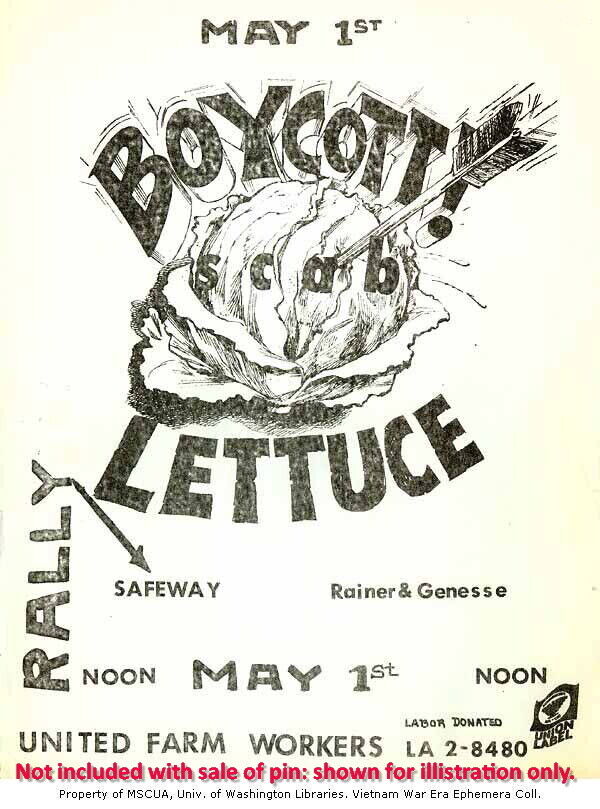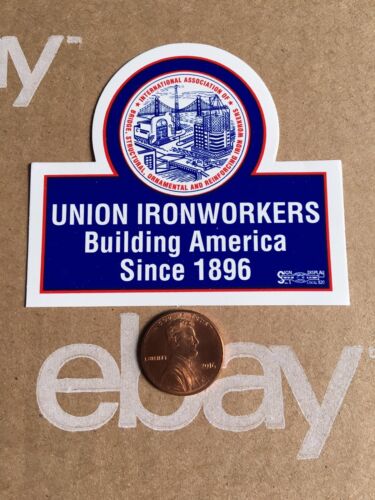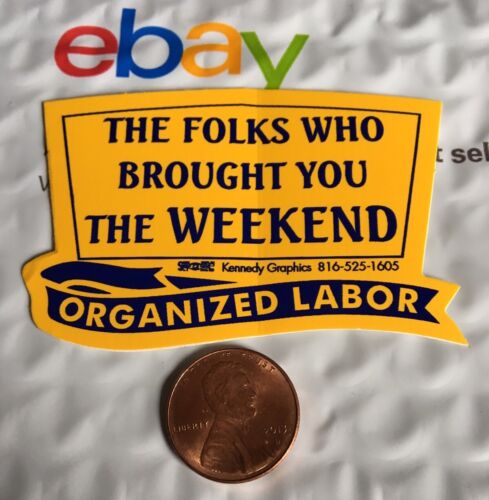-40%
Circa 1970 -73 UFW United Farm Workers SALAD BOWL STRIKE Lettuce Protest Pin
$ 7.89
- Description
- Size Guide
Description
OFFERED FOR SALE IS THIS1 1/4 INCH CELLULOID PINBACK BUTTON
IN WHAT I BELIEVE TO BE REALLY GREAT SHAPE.
HOWEVER, THAT IS JUST MY OPINION.
SEE PHOTOS FOR CONDITION
, AND YOU BE THE JUDGE.
IF YOU HAVE ANY QUESTIONS, PLEASE CONTACT ME BEFORE BIDDING OR BUYING.
RETURNS ARE NOT ACCEPTED UNLESS THE ITEM IS NOT AS DESCRIBED OR SHOWN IN THE PHOTOS OR HAS SIGNIFICANT DAMAGE OR DEFECTS NOT VISIBLE IN THE PHOTOS OR OTHERWISE DESCRIBED.
GUARANTEED AUTHENTIC AND ORIGINAL AS DESCRIBED
.
Check out my other Political and Social Protest and Cause items listed on eBay
This pin was issued and sold in the U.S. circa 1970 - 1973 by the
United Farm Workers Organizing Committee
( UFOWC ) to raise funds and support in its struggle to organize lettuce and other vegetable workers, and against the Teamsters Union which had signed "sweet heart" deals with the growers. It came to be known as the Salad Bowl Strike. The pin encourages a boycott of non United Farm Workers picked lettuce.
See history below.
The pin has nice graphics of the UFW black Aztec eagle and a Stop Sign and reads:
STOP DON'T BUY NON-UNION LETTUCE
.
The Salad Bowl Strike
was a series of strikes, mass pickets, boycotts and secondary boycotts that began on August 23, 1970 and
led to the largest farm worker strike in U.S. history
. The strike was led by the
United Farm Workers
against the
International Brotherhood of Teamsters
.
By 1970, the UFW believed that its success over the Delano grape growers would lead hundreds of growers to recognize the union and negotiate contracts with the union. But the UFW was not the only union to see the end of the Delano grape strike as an opportunity. Six thousand drivers and packing workers in the Salinas Valley in California, represented by the
Teamsters
, struck on
July 17, 1970
effectively preventing most of the nation's summer lettuce crop from reaching consumers. The strike ended on July 23, but the contract included a
special agreement by the growers to give the Teamsters, not the UFW, access to farms and the right to organize workers into unions
. The UFW, which had long asserted jurisdiction over the field workers, was outraged, especially when the Teamsters signed a contract with the growers days later without having to do much organizing or build support among the workers.
UFW leader
César Chávez went on a hunger strike to protest the Teamsters' actions
and a state district court imposed a
temporary injunction to preempt UFW members from walking off the job
, the UFW held secret talks with the Teamsters to avert a strike by the UFW. An agreement to return jurisdiction over the field workers to the farm union was reached on August 12, and FreshPict Foods (then owned by the Purex Corporation) and Inter-Harvest (part of the United Fruit Company) broke ranks with the other lettuce growers and signed contracts with the UFW.
But the August 12 agreement collapsed, and
5,000–7,000 UFW workers struck the Salinas Valley growers
on August 23 in what was
the largest farm worker strike in U.S. history
. More workers walked off the job in the next few weeks, while other unions supported the strike, shipments of fresh lettuce nationwide almost ceased, and the price of lettuce doubled almost overnight.
Lettuce growers lost 0,000 a day.
A state
district court enjoined Chávez personally and the UFW as an organization from engaging in picketing
, but both Chávez and the union refused to obey the court's orders.
In
late September 1970, the UFW asked consumers to join in a nationwide boycott of all lettuce which had not been picked by members of the United Farm Workers
. Violence, sporadic at first but increasingly widespread, began to occur in the fields
. On November 4, 1970 a UFW regional office was bombed.
On December 4
federal marshals arrested Chávez and, for the first time in his life, César Chávez was put in jail
. Two days later, he was visited in the Monterey County jail in Salinas by former Olympic gold medal-winning decathlete
Rafer Johnson and Ethel Kennedy
, widow of slain Senator Robert F. Kennedy. Kennedy and Johnson were
attacked by an anti-union mob on the steps of the jail
, and only intervention by city police, Monterey county sheriff's deputies, and the
Brown Berets prevented a riot and injury to the visitors
.
Chávez was released by the Supreme Court of California on December 23
, but the next day called a strike against six additional lettuce growers.
The bitter strike ended on March 26, 1971
when the Teamsters and UFW signed a new jurisdictional agreement reaffirming the UFW's right to organize field workers.
However, the Salad Bowl strike
did not end the jurisdictional disagreement between the Teamsters and the UFW
. The Teamsters resumed their dispute with the UFW in December 1972, which led to further extensive disruptions in the state agricultural industry,
mass picketing, mass arrests, and extensive violence.
By
April 1973
, the UFW was "
fighting for our lives
" and threatening to launch a nationwide boycott of any grower which signed a contract with the Teamsters.
Thousands of UFW members began picketing in the fields on April 15, 1973
.
Mass arrests quickly occurred
, and many county jails were soon overflowing with detainees. The organizing battles between the two unions
became violent with audacious and brutal attacks on UFW members day and night
.
The UFW appeared to be losing the battle physically, legally, and organizationally. The
violence worsened
;
seventy farm workers were attacked on July 31
, a
UFW picketer was shot
on August 3, five
firebombs were thrown at UFW picket lines
on August 9,
two UFW members were shot
on August 11, and a UFW picketer was
shot to death
on August 16, 1973.
With the UFW beginning to buckle under the financial, legal, and organizational stress of the jurisdictional dispute, Chávez entered into talks with the Teamsters on August 6
but quit them on August 10. But
the Teamsters, too, had suffered greatly
(it is possible that the FBI still suspected the union of having links with organized crime and that this was bringing a lot of unwarranted attention focused onto The Mob), and the day after the peace talks ended the
Teamsters shocked other unions and many growers by repudiating all the contracts they had signed since the new round of battles had begun
.
Talks resumed, and a
tentative agreement was reached on September 27, 1973
in which the Teamsters again agreed to leave jurisdiction over farm field workers to the UFW.
This underground pinback button pin or badge relates to the Hippie (or Hippy ) Counterculture Movement of the psychedelic Sixties (1960s and Seventies (1970s). That movement included such themes and topics as peace, protest, civil rights, radical, socialist, communist, anarchist, union labor strikes, drugs, marijuana, pot, weed, lsd, acid, sds, iww, anti draft, anti war, anti rotc, welfare rights, poverty, equal rights, integration, gay, women's rights, black panthers, black power, left wing, liberal, etc. progressive political movement and is guaranteed to be genuine as described.
THIS IS MY HOBBY AND IS
NOT A BUSINESS
. THIS AND MY OTHER ITEMS ON EBAY ARE FROM MY PERSONAL COLLECTIONS AND WERE NOT INITIALLY ACQUIRED BY ME FOR RESALE. PROCEEDS GO TO BUY OTHER STUFF I AM INTERESTED IN COLLECTING.
I HAVE BEEN A LONG TIME MEMBER OF
A. P. I .C. (AMERICAN POLITICAL ITEMS COLLECTORS)
. IF YOU ARE NOT A MEMBER, YOU SHOULD CONSIDER JOINING.
IT IS A GREAT ORGANIZATION!
SHIPPING:
ITEMS WILL BE SAFELY PACKED TO AVOID DAMAGE DURING SHIPPING. ITEMS ARE SHIPPED BY
FIRST CLASS MAIL
.
SHIPPING TO DESTINATIONS
WITHIN THE UNITED STATES
IS
.50
OUTSIDE THE UNITED STATES
, SHIPPING IS
.00.
I WILL COMBINE SHIPPING CHARGES: JUST
WAIT TO PAY FOR ITEMS UNTIL I SEND AN INVOICE
WITH REDUCED SHIPPING CHARGES, OR REQUEST ONE. ONCE YOU PAY MULTIPLE SHIPPING CHARGES, I CANNOT REFUND THEM IN WHOLE OR IN PART.
SO PLEASE WAIT TO PAY.
THANK YOU FOR YOUR INTEREST.
The Deacons emerged as one of the first visible self-defense forces in the South and as such represented a new face of the
civil rights
movement. Traditional civil rights organizations remained silent on them or repudiated their activities. They were effective however in providing protection for local African Americans who sought to register to vote and for white and black civil rights workers in the area. The Deacons, for example, provided security for the 1966 March Against Fear from Memphis to Jackson,
Mississippi
. Moreover their presence in Southeastern Louisiana meant that the Klan would no longer be able to intimidate and terrorize local African Americans without challenge.
The strategy and methods that the Deacons employed attracted the attention and concern of the Federal Bureau of Investigation (FBI), which authorized an investigation into the group’s activities. The investigation stalled, however, when more influential black power organizations such as US and the
Black Panther Party
emerged after the
1965 Watts Riot
. With public attention, and the attention of the FBI focused elsewhere, the Deacons lost most of their notoriety and slowly declined in influence. By 1968 they were all but extinct. In 2003 the activities of the Deacons was the subject of a 2003, “Deacons for Defense.” - See more at: HTTPS://www.blackpast.org/aah/deacons-defense-and-justice#sthash.s6D3h3ZZ.dpuf
On July 10, 1964, a group of African American men in Jonesboro,
Louisiana
led by Earnest “Chilly Willy” Thomas and Frederick Douglas Kirkpatrick founded the group known as The Deacons for Defense and Justice to protect members of the
Congress of Racial Equality (CORE)
against Ku Klux Klan violence. Most of the “Deacons” were veterans of
World War II
and the
Korean War
. The Jonesboro chapter organized its first affiliate chapter in nearby Bogalusa, Louisiana led by Charles Sims, A.Z. Young and Robert Hicks. Eventually they organized a third chapter in Louisiana. The Deacons tense confrontation with the Klan in Bogalusa was crucial in forcing the federal government to intervene on behalf of the local African American community. The national attention they garnered also persuaded state and national officials to initiate efforts to neutralize the Klan in that area of the Deep South.
The Deacons emerged as one of the first visible self-defense forces in the South and as such represented a new face of the
civil rights
movement. Traditional civil rights organizations remained silent on them or repudiated their activities. They were effective however in providing protection for local African Americans who sought to register to vote and for white and black civil rights workers in the area. The Deacons, for example, provided security for the 1966 March Against Fear from Memphis to Jackson,
Mississippi
. Moreover their presence in Southeastern Louisiana meant that the Klan would no longer be able to intimidate and terrorize local African Americans without challenge.
The strategy and methods that the Deacons employed attracted the attention and concern of the Federal Bureau of Investigation (FBI), which authorized an investigation into the group’s activities. The investigation stalled, however, when more influential black power organizations such as US and the
Black Panther Party
emerged after the
1965 Watts Riot
. With public attention, and the attention of the FBI focused elsewhere, the Deacons lost most of their notoriety and slowly declined in influence. By 1968 they were all but extinct. In 2003 the activities of the Deacons was the subject of a 2003, “Deacons for Defense.” - See more at: HTTPS://www.blackpast.org/aah/deacons-defense-and-justice#sthash.s6D3h3ZZ.dpuf
On July 10, 1964, a group of African American men in Jonesboro,
Louisiana
led by Earnest “Chilly Willy” Thomas and Frederick Douglas Kirkpatrick founded the group known as The Deacons for Defense and Justice to protect members of the
Congress of Racial Equality (CORE)
against Ku Klux Klan violence. Most of the “Deacons” were veterans of
World War II
and the
Korean War
. The Jonesboro chapter organized its first affiliate chapter in nearby Bogalusa, Louisiana led by Charles Sims, A.Z. Young and Robert Hicks. Eventually they organized a third chapter in Louisiana. The Deacons tense confrontation with the Klan in Bogalusa was crucial in forcing the federal government to intervene on behalf of the local African American community. The national attention they garnered also persuaded state and national officials to initiate efforts to neutralize the Klan in that area of the Deep South.
The Deacons emerged as one of the first visible self-defense forces in the South and as such represented a new face of the
civil rights
movement. Traditional civil rights organizations remained silent on them or repudiated their activities. They were effective however in providing protection for local African Americans who sought to register to vote and for white and black civil rights workers in the area. The Deacons, for example, provided security for the 1966 March Against Fear from Memphis to Jackson,
Mississippi
. Moreover their presence in Southeastern Louisiana meant that the Klan would no longer be able to intimidate and terrorize local African Americans without challenge.
The strategy and methods that the Deacons employed attracted the attention and concern of the Federal Bureau of Investigation (FBI), which authorized an investigation into the group’s activities. The investigation stalled, however, when more influential black power organizations such as US and the
Black Panther Party
emerged after the
1965 Watts Riot
. With public attention, and the attention of the FBI focused elsewhere, the Deacons lost most of their notoriety and slowly declined in influence. By 1968 they were all but extinct. In 2003 the activities of the Deacons was the subject of a 2003, “Deacons for Defense.” - See more at: HTTPS://www.blackpast.org/aah/deacons-defense-and-justice#sthash.s6D3h3ZZ.dpuf
On July 10, 1964, a group of African American men in Jonesboro,
Louisiana
led by Earnest “Chilly Willy” Thomas and Frederick Douglas Kirkpatrick founded the group known as The Deacons for Defense and Justice to protect members of the
Congress of Racial Equality (CORE)
against Ku Klux Klan violence. Most of the “Deacons” were veterans of
World War II
and the
Korean War
. The Jonesboro chapter organized its first affiliate chapter in nearby Bogalusa, Louisiana led by Charles Sims, A.Z. Young and Robert Hicks. Eventually they organized a third chapter in Louisiana. The Deacons tense confrontation with the Klan in Bogalusa was crucial in forcing the federal government to intervene on behalf of the local African American community. The national attention they garnered also persuaded state and national officials to initiate efforts to neutralize the Klan in that area of the Deep South. - See more at: HTTPS://www.blackpast.org/aah/deacons-defense-and-justice#sthash.s6D3h3ZZ.dpuf
